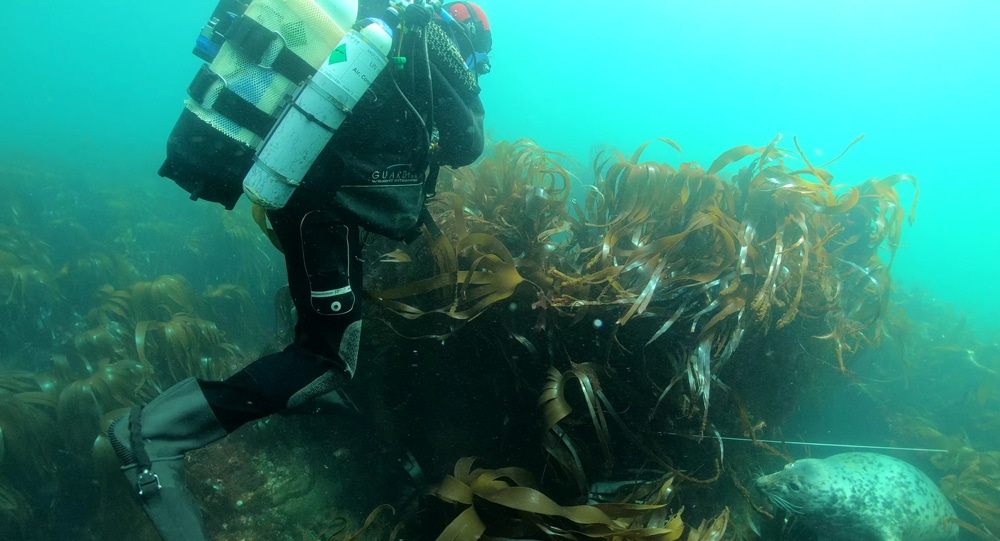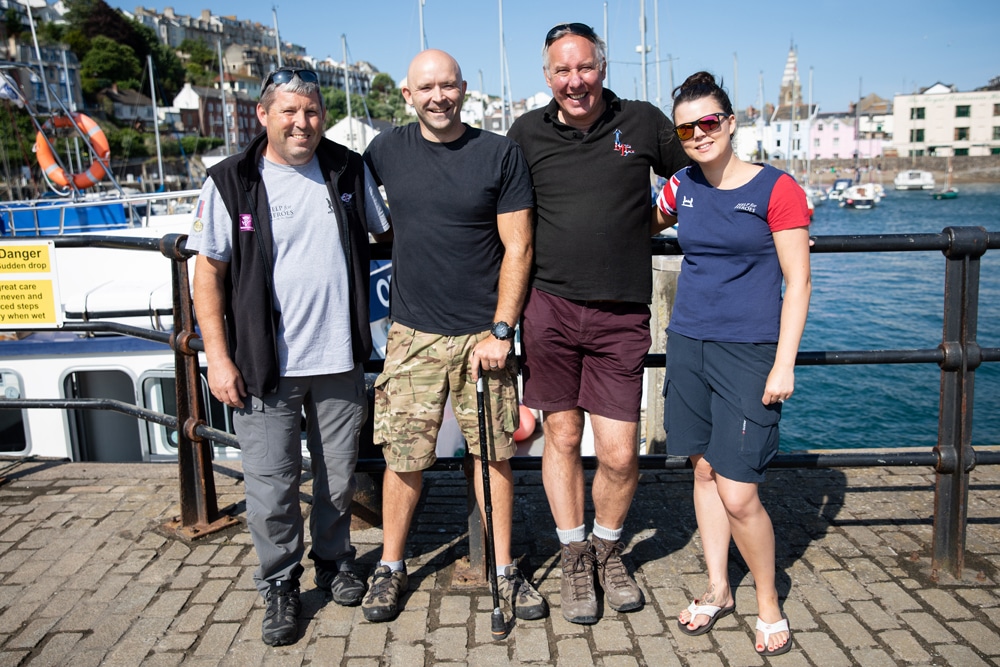News
HMS Montagu granted protection

![]() The wreck of the pre-First World War battleship HMS Montagu, and a series of steps that were cut into the cliff face on Lundy Island in the Bristol Channel to help salvage the wreck after she ran aground in 1906, have been granted protection by the Department for Digital, Culture, Media and Sport on the advice of Historic England. HMS Montagu and the associated ‘Montagu Steps’ have been scheduled and added to the National Heritage List for England.
The wreck of the pre-First World War battleship HMS Montagu, and a series of steps that were cut into the cliff face on Lundy Island in the Bristol Channel to help salvage the wreck after she ran aground in 1906, have been granted protection by the Department for Digital, Culture, Media and Sport on the advice of Historic England. HMS Montagu and the associated ‘Montagu Steps’ have been scheduled and added to the National Heritage List for England.
HMS Montagu was launched in March 1901 and was built in response to large French, Russian and German ship-building programmes prior to the First World War. It is an example of the transition of warship development between the 19th century ‘Ironclads’ and the revolutionary turbine-powered big gun British ‘Dreadnought’ warships launched in 1906, the same year when HMS Montagu ran aground. HMS Montagu is rare as the only surviving ‘Duncan’ class battleship anywhere in north European or English waters.
On 30 May 1906 HMS Montagu grounded on rocks around the Isle of Lundy at Shutter Point in thick fog, due to a navigational error while undertaking secret radio communication trials. It could not be saved and had to be broken up and salvaged where it lay.
Helen Whately, Heritage Minister said: “HMS Montagu and the Montagu Steps are all part of our nation’s fascinating naval history. Sites like these must be protected for future generations and together with Historic England and Help for Heroes, we have now done exactly that.”
Duncan Wilson, Chief Executive of Historic England, said: “Not only is the wreck of HMS Montagu important for what it can tell us about pre-First World War naval shipbuilding, but it is forever linked to the landscape of Lundy Island by the distinctive flight of rock-cut steps. Combined, the wreck and the steps provide a rare group of maritime monuments.”
Dr Dan Atkinson, Coastal & Marine Director at Wessex Archaeology said: “We’re delighted that our archaeological work last year, carried out on behalf of Historic England, has led to HMS Montagu being granted heritage protection. It’s a rare example of a pre-Dreadnought battleship, marking a fascinating period of expansion and innovation in the UK’s naval forces and, since its foundering in 1906, has remained an intrinsic part of the Lundy community’s cultural identity, enjoyed by locals, tourists and the diving community alike.”
HMS Montagu was initially salvaged by the Liverpool Salvage Company for the British navy but in June 1907 the wreck was sold to the Cornish Salvage Company. An aerial walkway, suspended from the island cliffs to the wreck, was constructed and a series of steps were cut into the cliff face to help with the salvage operation.
The steps were built in 1907 and are now known as the ‘Montagu Steps’. They are recorded on Ordnance Survey mapping and survive to the present day as a reminder of the salvage operation on the stranded battleship. They are cut into the granite of Lundy Island and were reinforced with iron plates in places which are likely to be parts of HMS Montagu’s hull salvaged from the wreck. A reinforced suspension bridge comprised of over 10 tons of material was built from HMS Montagu to the cliff steps, ensuring the passage to the stricken vessel was possible in any weather and at any state of the tide. Remarkably, the bridge was completed in just 32 hours.
Last summer, wounded veterans carried out a series of dives on the wreck of HMS Montagu to determine what remains of the wreck. This project was funded by Historic England, the charity Help for Heroes, which helps British service personnel and veterans wounded in the line of duty and their families, and Wessex Archaeology. The archaeological and historical data gathered from last summer’s underwater survey work contributed towards the decision to protect this important site in the Bristol Channel.
For more information please visit the Historic England website by clicking here.
Gear News
Introducing the TR-80, IR-50 and CS-30 Regulators from DYNAMICNORD

Whether you are a beginner or a professional diver – with the three new main regulators from DYNAMICNORD, everyone will find their favourite regulator. They all look super stylish.
Excellent performance with the TR-80
Quality and performance are the be-all and end-all for regulators. It is not for nothing that the TR stands for Tec Reg. The innovative design of the TR-80 guarantees absolute reliability – even in ice-cold waters.

Perfect breathing effort at 0.8 J/l / certified for diving in waters below 10 degrees / structural design made of solid brass for best cold protection / membrane-compensated design with dry seal of the first stage / reduced exhalation effort thanks to optimized exhalation membrane and bubble deflector / adjustable Venturi (dive/predive) and adjustment knob for individual inhalation comfort / innovative design of the front cover prevents free-flow in strong currents or when diving with scooters / design made of sandblasted brass, matt chrome finish / 2 HP and 4 LP outlets / mouthpiece made of high-quality, anti-allergic silicone for maximum comfort.


Amazing underwater adventures with the IR-50
The IR-50 is the top regulator for advanced and experienced divers. Natural breathing is the essence of this regulator.

Ideal breathing effort at 0.8 J/l /certified for diving in waters below 10 degrees / compensated membrane / adjustable venturi (dive/predive) and adjustment knob for individual inhalation comfort/ outlet valve and deflector for minimum exhalation effort and reduction of bubbles on the face / design made of sandblasted brass, matt chrome finish / 2 HP and 4 NP outlets / mouthpiece made of high-quality, anti-allergic silicone for maximum comfort.


The Workhorse – our CS-30
For diving centres and diving beginners – the workhorse stands for strong construction, reliability and robustness. Perfect for your training.

Optimal breathing effort at 0.8 J/l /recommended for diving in waters above 10 degrees / non-compensated piston / adjustable venturi (dive/predive) / outlet valve and deflector for minimum exhalation effort and reduction of bubbles on the face / design made of sandblasted brass, matt chrome finish / 1 HP and 3 NP outlets / mouthpiece made of high-quality, anti-allergic silicone for maximum comfort.


Octopus OP-30
The OP-30 is the ideal addition to all DYNAMICNORD regulators. It is identical in construction to the CS-30.

The TR-80, IR-50, CS-30 (DIN & INT) regulators and the Octopus OP-30 are available from DYNAMICNORD dealers and in the online store.
DYNAMICNORD – Your Outdoor Companion.
Marine Life & Conservation
Paul Watson Released as Denmark Blocks Japan’s Extradition Bid

Renowned anti-whaling activist Paul Watson has been released from custody in Greenland after spending five months in detention. Denmark’s Justice Ministry rejected Japan’s request for his extradition, citing insufficient guarantees that his time already served in custody would be credited against any potential sentence.
The 74-year-old Canadian-American was arrested on July 21 in Nuuk, Greenland’s capital, when his ship docked to refuel. His arrest was based on a 2012 Japanese warrant related to a 2010 encounter in Antarctic waters. Japan alleged Watson obstructed operations and caused damage to a whaling research ship during efforts to disrupt illegal whaling. Watson has consistently denied these claims, maintaining his commitment to marine conservation.
Denmark, which oversees extradition matters for Greenland, concluded that while the legal conditions for extradition were met, the lack of assurances from Japan regarding time-served credit made extradition untenable.
In a video shared by his foundation, Watson expressed gratitude and relief, saying, “After five months, it’s good to be out… and good to know they’re not sending me to Japan.” He added that the most difficult part of his time in custody was being separated from his two young sons.
Watson is a pioneering figure in marine conservation, known for founding the Captain Paul Watson Foundation in 2022 after decades of activism with the Sea Shepherd Conservation Society. His bold efforts to defend marine life have earned him widespread support, including from celebrities and conservationists. His work has also been featured in the acclaimed reality TV series Whale Wars.
Watson’s lawyer, Jonas Christoffersen, praised the decision, stating, “We are happy and relieved that Paul Watson is now free.” He added that Watson is eager to reunite with his family and continue his vital work.
The arrest occurred while Watson’s vessel, the M/Y John Paul DeJoria, was en route to the North Pacific with a team of 26 volunteers to intercept a Japanese whaling ship. His foundation described the arrest as politically motivated and emphasized that Watson’s actions were focused on ending illegal whaling practices.
Japan resumed commercial whaling in 2019 after leaving the International Whaling Commission, asserting that whale meat is a cultural tradition. Conservationists, however, continue to challenge these practices, highlighting their impact on marine ecosystems.
Despite the challenges, Watson remains steadfast in his mission to protect marine life and bring attention to whaling practices. His dedication to ocean conservation has made him a globally respected advocate for the environment.
-

 News2 months ago
News2 months agoIconic SS United States to become the World’s Largest Artificial Reef
-

 News3 months ago
News3 months agoBook Review – 52 Assignments: Underwater Photography
-

 Gear News3 months ago
Gear News3 months agoDYNAMICNORD – New German diving brand enters the British market
-

 News3 months ago
News3 months agoExploring Cenote El Pit: A Diver’s Dream
-

 Gear News3 months ago
Gear News3 months agoTry BARE drysuits (and maybe even win one!) this Friday with Sea & Sea at North West Dive Fest
-

 Marine Life & Conservation3 months ago
Marine Life & Conservation3 months agoBook Review: Coral Triangle Cameos
-

 Blogs2 months ago
Blogs2 months agoDive the Egyptian Red Sea this Autumn with Regaldive
-

 News3 months ago
News3 months ago2024 Ocean Art Underwater Photo Competition Announced















